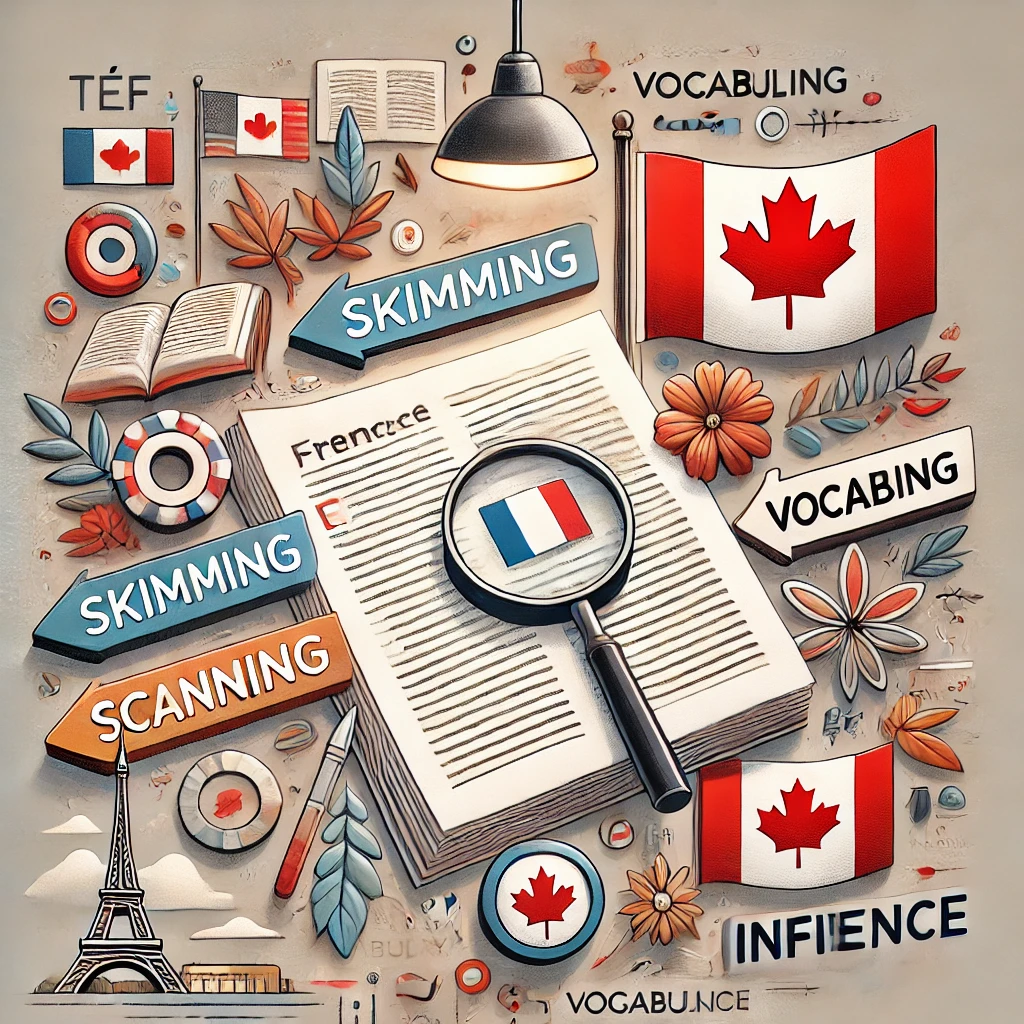The Test d’Évaluation de Français (TEF) is a language proficiency test widely recognized for Canadian immigration purposes. Among its various sections, the reading comprehension (compréhension écrite) part can be particularly challenging. It evaluates your ability to understand written French in diverse contexts, making preparation essential for achieving a high score.
In this blog, we’ll explore actionable strategies to enhance your TEF Canada reading comprehension skills and achieve success in this critical section of the test.
Understanding the TEF Canada Reading Comprehension Section
The TEF Canada reading comprehension section assesses how well you can:
- Understand written instructions, articles, and narratives.
- Identify the main ideas and supporting details.
- Interpret tone, intent, and context.
- Infer meaning from unfamiliar words or phrases.
This section includes multiple-choice questions and covers various text types, such as advertisements, formal letters, articles, and extracts from books.
Challenges in TEF Reading Comprehension
Many candidates struggle with the reading comprehension section due to:
- Time Constraints: Managing time effectively during the test is crucial.
- Complex Vocabulary: Advanced words or expressions may be unfamiliar.
- Varied Topics: Texts can range from business contexts to cultural discussions.
- Inference Questions: These require deep analysis and understanding.
Proven Strategies to Boost Reading Comprehension
1. Build Your Vocabulary
Expanding your French vocabulary is essential for tackling diverse texts.
- Use Flashcards: Write down unfamiliar words and review them daily.
- Learn Synonyms and Antonyms: This broadens your understanding of word usage.
- Focus on Context-Specific Words: Prioritize vocabulary related to common TEF topics like immigration, education, and daily life.
2. Practice Skimming and Scanning
Efficient reading techniques help you navigate texts quickly:
- Skimming: Read quickly to grasp the main idea of the passage.
- Scanning: Search for specific information, such as dates, names, or keywords, to answer targeted questions.
3. Read French Texts Regularly
Immerse yourself in authentic French materials to familiarize yourself with various text structures and tones:
- Newspapers and Magazines: Le Monde, Le Figaro, and L’Obs are excellent sources.
- Online Blogs and Forums: Explore articles on topics of personal interest.
- Books and Short Stories: Begin with simple texts and gradually progress to more complex literature.
4. Practice with TEF-Specific Materials
Using TEF practice books and online resources simulates the test environment:
- Solve past papers to understand the question format.
- Time yourself to improve speed and accuracy.
- Analyze your mistakes to identify areas of improvement.
5. Focus on Grammar and Sentence Structure
Strong grammar skills help you decode complex sentences:
- Review verb conjugations, tenses, and sentence connectors.
- Understand relative pronouns (qui, que, dont) and their roles in forming complex sentences.
6. Work on Inference Skills
TEF questions often test your ability to read between the lines:
- Practice deducing meaning from context without relying on a dictionary.
- Pay attention to tone indicators such as malheureusement (unfortunately) or heureusement (fortunately).
7. Take Notes While Reading
Jotting down key points helps you retain important details and navigate back to specific parts of the text during the test.
Sample Practice Exercise
Let’s apply some of these techniques to a short example:
Passage:
“Depuis des années, les gouvernements du monde entier tentent de réduire l’utilisation des combustibles fossiles en investissant dans des énergies renouvelables. Cependant, les résultats obtenus restent insuffisants en raison de divers obstacles politiques et économiques.”
Question:
Que suggère ce texte sur les efforts pour réduire l’utilisation des combustibles fossiles ?
A. Ils ont complètement échoué.
B. Ils ont rencontré des difficultés.
C. Ils sont principalement réussis.
D. Ils sont inutiles.
Answer: B. The text mentions obstacles that have limited success but does not suggest complete failure.
By breaking the text into key points and focusing on inference, you can arrive at the correct answer.
Time Management Tips
Efficient time management is crucial for success in the TEF reading section:
- Allocate time based on question complexity—spend more time on inference questions and less on straightforward ones.
- Skip and return to difficult questions rather than lingering on them.
- Regularly practice with a timer to improve speed.
Boosting Confidence Through Consistency
Improving reading comprehension takes consistent effort. By following the strategies outlined here and regularly engaging with French texts, you’ll build confidence and accuracy over time.
Conclusion
Excelling in the TEF Canada reading comprehension section requires more than basic reading skills—it demands a blend of vocabulary knowledge, efficient techniques, and practice. By building your vocabulary, practicing active reading, and familiarizing yourself with the test structure, you can significantly boost your performance.
Remember, consistency is the key to mastering reading comprehension. Dedicate time daily to reading and practicing, and soon, you’ll find yourself navigating the complexities of French texts with ease.
Bonne chance! 🌟


